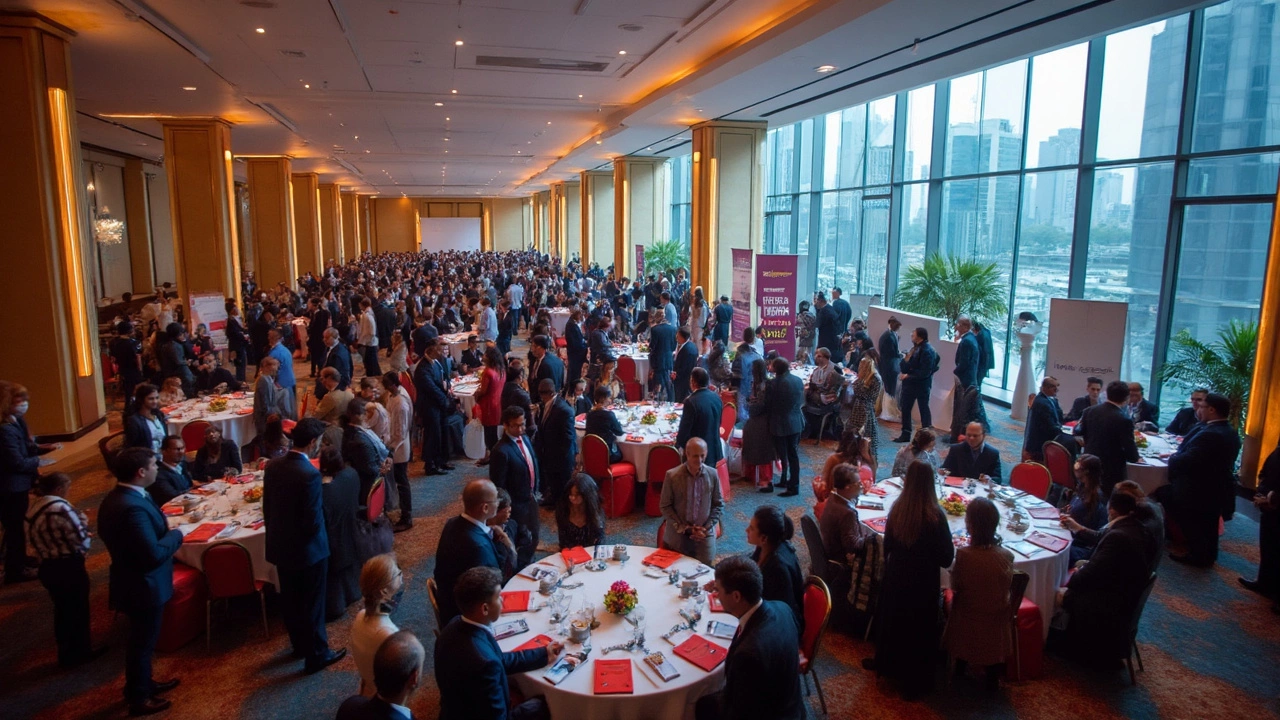Profitable Event Types: What Events Make the Most Money?
 Jun, 28 2025
Jun, 28 2025
Here’s a shocker: the world’s biggest events aren’t just about fun or community—they're serious money machines. Some pull in millions, even billions, in a matter of days. People flock across the globe, sponsors elbow each other for a slice of the hype, and businesses bank on record sales, all powered by smart planning. So, what’s the secret mix that makes certain events so insanely profitable?
The Heavyweights: What Kind of Events Rake in the Most Cash?
When we talk about money-making events, think massive scale, mainstream hype, and relentless sponsorship dollars. Topping the charts are sports mega-events. The FIFA World Cup, the Olympics, and the Super Bowl are in a league of their own. For example, the Super Bowl isn’t just a football game; it’s a cultural phenomenon. In 2024, it brought in over $650 million in ad revenue on TV alone. Tickets can cost thousands, corporate boxes run into the six-figures, and millions are spent on related merchandise and local tourism. The recipe? Combine media rights with advertising, ticket sales, and global sponsors eager to push their brands to billions of viewers.
But here’s where it gets interesting: the concert industry comes in hot. Think Taylor Swift’s Eras Tour, which generated over $1 billion worldwide by mid-2024. Large-scale music festivals like Coachella or Glastonbury generate hundreds of millions, drawing in sponsorship deals from fashion and tech brands, skyrocketing ticket prices, and VIP experience upcharges. Then you’ve got conventions—Comic-Con, E3, and business expos like the Consumer Electronics Show. CES alone generates an estimated $300 million for the Las Vegas economy each year, as companies pay big money to exhibit and network.
And if you’re thinking smaller can’t win, think again. Charity galas, high-end auctions, and luxury weddings regularly hit the million-dollar mark—sometimes in a single night. The trick? Targeting guests who can and will spend huge sums for truly exclusive experiences or causes close to their hearts.
What Makes These Events Stand Out Financially?
Let’s get practical. Why do certain events just work so well financially? First, they gather huge, enthusiastic crowds. If an event draws thousands or even tens of thousands in person, that’s a big baseline—especially if attendees are ready to spend. Second, the best events build an irresistible buzz. Smart marketing, social media trends, and the right celebrity faces make an event feel impossible to miss. This FOMO (fear of missing out) drives ticket prices higher and gets people spending more.
Sponsorship is another major piece. When brands know an event will grab massive eyeballs—both in person and online—they’re ready to pay big for visibility. The Super Bowl’s ad slots reach $7 million for just 30 seconds. Then there’s the art of upselling: priority seating, backstage passes, VIP lounges, exclusive merchandise drops—people pay more for perks. Don’t forget media rights. Broadcasting games and concerts worldwide is a goldmine. For example, the Premier League makes over $4 billion per year just from selling the rights to show matches.
Location and timing matter, too. Host an event in a global hotspot or schedule it around public holidays and you’ll double (or triple) turnout. And don’t underestimate afterparties and side events—each an excuse to add value and sell extra access.

Breaking Down Profit Streams: Where’s the Money Coming From?
It’s not just about tickets; revenue flows from all directions. Check out this breakdown:
| Income Stream | Example | Contribution to Total |
|---|---|---|
| Ticket Sales | Concerts, Sports Games | 25-50% |
| Sponsorship & Ads | Super Bowl, Wimbledon | 30-40% |
| Broadcast Rights | Olympics, FIFA World Cup | 30-60% |
| Merchandise | Festivals, Conventions | 5-15% |
| Concessions & Food | Any Large Event | 5-10% |
| VIP and Upsells | Gala Dinners, VVIP Concert Tickets | 5-20% |
Notice how the biggest chunk usually comes from either broadcast rights or sponsorships, not just attendees. That’s why cultivating the right industry connections and knowing what brands want is priceless. The best events never rely on a single stream—they diversify, stack, and layer, so even if ticket sales dip one year, other streams pick up the slack.
Insider Tips: How Planners Maximize Event Earnings
You might think it’s all about star power and big crowds, but event organizers have a few clever tricks up their sleeves. Pre-sale tickets and early-bird discounts get cash flowing before the event even starts. Dynamic pricing means that as tickets get scarce, prices rise—just like airlines do. Onsite, contactless payments, mobile event apps, and wristbands make it easier for guests to buy more things, from drinks to souvenirs, on a whim.
And let’s talk partnerships. The right venue sponsor can shave rental costs or even pay to be part of the action. Influencers and social media campaigns turn a local event global, attracting online participants who buy streaming packages or exclusive access to digital content. Data is the event planner’s secret weapon. Tracking which items sell best, when food courts get busiest, or which posts draw the most buzz helps organizers tweak the next year for even bigger profits.
Virtual and hybrid events are booming. After the pandemic, planners realized you don’t have to pack thousands into a room to make a killing. Virtual tickets, online merchandise, and digital meet-and-greets open up new ways to earn from people anywhere. Plus, running costs drop without massive physical set-ups and logistics. Festivals now sell “front row” home experiences, and some sports leagues let you pay to watch live streams with extra camera angles. Flexibility is king.
Not everything is about going big. Sometimes, it’s about going niche. Gaming tournaments, for instance, bring in sponsorships from tech giants, sell exclusive in-game items, and charge for premium online broadcasts. Esports has seen prize pools surge past $40 million for a single event, all powered by fan engagement and savvy partnerships.

Event Planning Pitfalls and How to Dodge Them
Here’s a reality check: not every event will strike gold. Sometimes the risks hit as hard as the rewards. Poor weather, last-minute venue issues, or even a global crisis can leave organizers scrambling. Budget blowouts sink a lot of would-be million-dollar ideas. That’s why it’s critical to keep tight control over expenses, lock in sponsorships early, and always have a “rainy day” fund.
Legal and insurance headaches lurk, especially for big gatherings. Nobody wants a festival to go viral for the wrong reasons (remember Fyre Festival?). Smart planners build backup plans and check cancellation policies and permits twice. Crowd safety is essential—one bad accident or security slip can kill profits and reputation overnight.
Even marketing fatigue is real. If your event feels tired or copy-pasted from a dozen others, you’ll struggle to stand out. Planners stay creative: mixing up locations, surprise performances, interactive elements (like scavenger hunts), or hands-on workshops pull crowds and keep buzz alive.
Data privacy can be tricky, too. Many events collect loads of information on guests—be careful with email lists, payment data, and online ticketing platforms. Compliance with international laws isn’t optional anymore, especially as events and audiences cross borders online.
So, making massive money in the event industry is part know-how, part creativity, plenty of hustle… and just a sprinkle of luck. But next time you see those packed stadiums, sold-out festivals, or queues for a gaming convention, you’ll know exactly what’s happening behind those velvet ropes—and maybe even spot a few ways to cash in yourself.